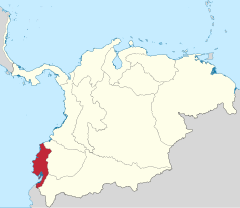This article includes a list of general references, but it lacks sufficient corresponding inline citations. (July 2022) |
This article may be a rough translation from Spanish. It may have been generated, in whole or in part, by a computer or by a translator without dual proficiency. (June 2022) |
| Part of the Dissolution of Gran Colombia | |
 Location of the department of Guayaquil in Gran Colombia | |
| Date | April-October 1827 |
|---|---|
| Location | Guayaquil department, |
| Outcome | Military intervention by Colombian troops that re-established the constitutional order in the rebel department. |
| History of Ecuador |
|---|
 |
|
|
The 1827 Guayaquil uprising, also known as the Guayaquil Department rebellion, was a rejection of the centralist policies of Gran Colombia. This was one of the first separatist rebellions in the country of Gran Colombia before it dissolved in 1829.
The Free Province of Guayaquil, an unrecognized state that emerged after it declared its independence on October 9, 1820, was militarily annexed by Gran Colombia in 1822. As a result of the promulgation of the Territorial Division Law of 1824, it became one of the three departments of the Southern District. Colombian policies strengthened New Granadan centralism, imposed various taxes, and divided the departments into several provinces and cantons with their own municipalities. This all undermined the power of the authorities in the departmental capitals and caused unrest in various parts of the country. In addition, the drafting of the Life Constitution for Peru and the similar project in Bolivia by Simón Bolívar generated much controversy, and a mutiny in the Colombian military. The Cabildo of Guayaquil endorsed the Bolivian constitution, ignored the Constitution of Cúcuta, and appointed José de la Mar as its new mayor. In addition, it proclaimed total autonomy from the Republic.
The departure of La Mar and sending of Colombian troops from Quito and Bogotá to the borders of the department made the Cabildo of Guayaquil state that it supported a federalist constitutional reform, and temporarily suspended its autonomy, until the formation of a new constituent congress. However, its political autonomy lasted until October 1827, when General Juan José Flores entered the city of Guayaquil with the Colombian army to restore constitutional order.
